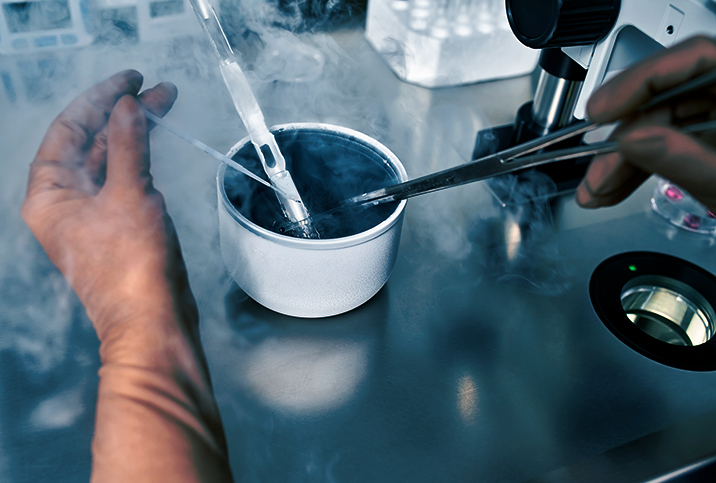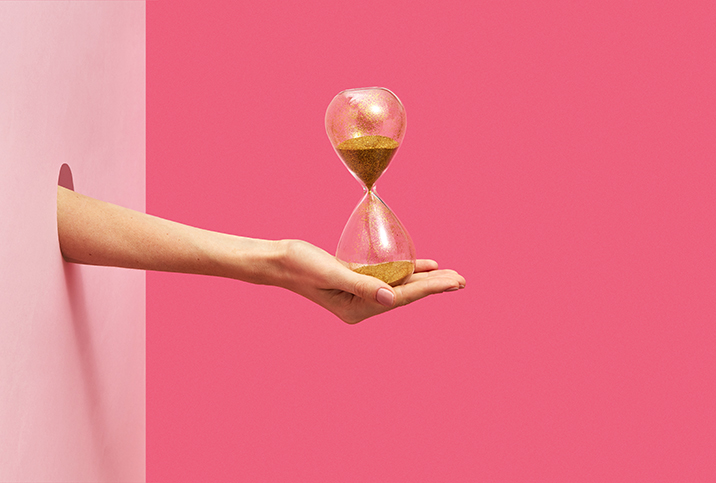Does Donating Your Eggs Make Freezing More Affordable?

Editor's note: Some of the sources for this article requested their full names not be used.
Key Points
- If you donate some of your eggs, some fertility clinics let you freeze your eggs for free.
- It's difficult to say how many clinics offer free egg freezing in return for donation, but it's not uncommon.
- Egg freezing is an option but not a guarantee.
A whirlwind romance can be exhilarating, but feeling like you must race against your biological clock to find the love of your life? Not so much. You can always freeze some eggs, but you've heard it's expensive.
A new program may help women reduce their associated costs with freezing eggs.
How can women affordably freeze their eggs?
Hearing about her friends' struggles with age-related infertility, Laura realized time wasn't on her side if she wanted to have a child naturally.
"I had begun to feel pressure to 'find the right guy,' which was sucking the joy out of my life," Laura said.
Sentiments like that resonate.
"It was quite heartbreaking to hear their stories, and I realized freezing my eggs would be an enormous act of love, both for myself and a future partner, who I've since found," another woman, Eliot, said.
Instead of traditional egg freezing, however, Eliot opted for a program that allows eligible women to freeze their eggs for free in exchange for donating half of them to someone in need.
Aimee Eyvazzadeh, M.D., M.P.H., a reproductive endocrinologist in San Ramon, California, facilitated Eliot's donation and egg preservation. Although she has offered patients the option informally since 2008, her official "freeze-and-share" program began in 2017 after a woman who had donated eggs 20 years earlier needed a donor herself.
"When I started my practice 10 years ago, one of my first patients was a 40-year-old woman who had done over five years of IVF treatment before seeing me and now needed donor eggs," she said. "My heart broke when she shared that she was an egg donor when she was 22.
"Egg donation is literally giving someone the gift of life, and now this woman had to use an egg donor after she donated her eggs to six other families. This felt so incredibly unfair to me."
Recommended
- What's It Like to Donate Your Eggs?: The process can be rewarding in more ways than one. But it's not easy or risk-free.
- The Impact of Rigorous Physical Activity on Your Fertility: Can vigorous athletic training negatively affect your ability to get pregnant?
- The Cost Breakdown on Freezing Your Eggs: Fertility treatments offer hope to many, but the expenses can be prohibitive.
That patient wasn't alone. Others have asked Eyvazzadeh to call clinics they've donated their eggs to to see if any eggs remained. The answer has always been no.
"Donating eggs isn't like donating an organ like a kidney. Once you donate a kidney, the other kidney doesn't 'run out.' It keeps working for the rest of your life," Eyvazzadeh said. "Women's eggs inevitably run out and may run out at a time in her life when she hasn't started or completed her family."
For more than 20 years, clinics in the United Kingdom have offered programs in which women can offset the cost of an in vitro fertilization (IVF) cycle in exchange for giving half of the retrieved eggs to a paying patient.
These don't embody the same spirit as an actual "freeze-and-share" model, Eyvazzadeh said.
It's unknown how many of these programs exist. An increasing number have popped up in fertility centers in the United States and the U.K. in recent years, owing to a couple of factors. One, the American Society of Reproductive Medicine removed the "experimental" label on egg freezing; two, the demand for fertility preservation has risen.
Here's how egg freezing and donation work and how marrying the two might benefit some people.
Why do women freeze their eggs?
People consider freezing eggs for two primary reasons. For women such as Eliot, it can be an opportunity to proactively manage health and prospects.
Women in this group may want to travel more, focus on their careers, continue their education or find the right partner—maybe all of the above—before they start a family. Healthcare providers and insurance companies sometimes call this "elective" egg freezing.
"The biological pressure to have kids before a certain age puts unfounded pressure on many young women like me and, in some cases, dictates our career, partner and lifestyle choices," said Sara, a San Francisco resident who froze and donated her eggs through Cofertility, an egg-sharing program that works with clinics across the country.
Egg quality and quantity diminishes over time, beginning at 32 and even faster after 37, according to the American College of Obstetricians and Gynecologists. The older a woman is, the more difficult it's likely to be for her to become pregnant and carry a healthy pregnancy to term.
For various reasons, people are starting families later than ever, said Lauren Steingold Makler, the CEO and co-founder of Cofertility.
"Data from the latest U.S. Census Bureau figures show that, for the first time, the average age of women giving birth is now 30 in the U.S., the highest on record," Makler said.
Epidemiological studies indicate most people who freeze their eggs are single women between the ages of 36 and 40 with college degrees and careers. However, the best age to freeze eggs is 35 or younger.
Those older than 35 with a partner should consider embryo freezing instead.
"I like to think of egg freezing as the ultimate prevention method for fertility regret. It also keeps doors open for women to pursue love and career on their own time, and who doesn't want that?" Eyvazzadeh said. "How many people do you know that settle into relationships because their biological clock is ticking, have children and then divorce?"
In other cases, doctors advise women to freeze their eggs for medical reasons. Patients in this category may be battling a health condition, such as cancer, or have a family history of illness that could impact fertility.
Why has interest in egg freezing skyrocketed?
Egg-freezing technology emerged in the 1980s but was initially reserved for people with malignant diseases, and success rates were low. It wasn't until the late 1990s that a fertility clinic began offering egg freezing to the public.
Since then, technology has evolved substantially and success rates have risen significantly, according to Michael Guarnaccia, M.D., M.P.H., a New York City-based reproductive endocrinologist at Oma Fertility, which offers a freeze-and-donate program.
Data from the Society for Reproductive Technology, which tracks IVF data, indicated a 50 percent increase in egg freezing between 2017 and 2019, said Bat-Sheva Maslow, M.D., a reproductive endocrinologist with Reproductive Medical Associates of New Jersey, a fertility clinic in Bernards Township.
The number of egg-freezing cycles rose by 31 percent in 2021, according to the American Society for Reproductive Medicine (ASRM).
That's due, in part, to rising maternal age.
"It's staggering to think how significantly longer we are living and everything we see as new biological challenges are in direct response to that, and there's a direct correlation to that, too," Eyvazzadeh said. "Egg freezing is simply a new solution to address a new-ish problem."
The pandemic, which temporarily halted non-essential medical care and forced many people to reconsider their priorities and plans, also played a role, Maslow said.
"The pandemic led to a lot of reprioritizing in all areas of life, which may have motivated women who were previously unsure about fertility preservation, or who hadn't seriously thought about their reproductive goals, to consider fertility preservation," she said.
There's been an increase in financial support for fertility preservation from insurance companies and employer benefit packages.
"Plus, my patients say they feel more empowered to speak about their personal experiences," she said. "I think women pursuing egg freezing and then sharing about it, either privately with their friends or publicly on social media, leads to even more women seeking the opportunity to do it."
How many egg donors are there?
"Historically, there are more people who need donor eggs than there are donors available," Maslow said.
The number of IVF cycles involving donated eggs or embryos rose nearly 27 percent between 2005 and 2014, according to the 2014 Assisted Reproductive Technology National Summary Report.
People need donors for a variety of reasons. Some are men in relationships with men who want to work with a surrogate. Others are young women with health conditions that have led to infertility.
However, most people seeking donations are heterosexual couples in which the woman is in her late 30s to 40s. Many women could not freeze their eggs earlier due to cost or other factors, and fertility treatments using their own eggs have been unsuccessful.
As more people put off pregnancy until later in life, the latter demographic continues to grow.
How much do you get from donating eggs?
Compensation for a standard egg donation varies substantially from one donor and clinic to another. On average, most clinics in the U.S. offer between $5,000 and $10,000 per egg donation cycle, plus the cost of medical care and travel.
Some providers, primarily those in larger cities, pay closer to $20,000, and a few pay $50,000 or more for repeat donations, or "elite" donors, according to The New York Times.
Of course, it's not all about the money. Many donors are more motivated by altruism than cash, a 2014 report suggested.
How much does it cost to freeze eggs?
Increasing demand is gradually decreasing the cost of egg freezing, according to CNBC.
Still, most healthcare plans don't cover elective egg freezing, according to Fertility IQ, an online database of fertility treatment information. On average, a single cycle in the U.S. is between $15,000 and $20,000, per the site. Most people need at least two cycles, which can drive the total cost to $40,000 or more.
"It's simply out of reach for most women," Makler said. "As we say, unfortunately for most of us, the best time to freeze our eggs is when we can least afford it."
How do egg freeze-and-share programs work?
The specifics vary from one clinic to another, but at Eyvazzadeh and Guarnaccia's clinics, donors keep half of their frozen eggs and donate the other half. They don't pay for anything, including travel, and receive five years of storage for free.
After five years, they pay the standard annual storage fee and the cost of embryo creation when they want to use their eggs.
Egg donation requirements are the same for people who go the standard route or give through egg freeze-and-share programs.
As with typical egg donation, not everyone is eligible. Specifics vary by clinic, but most require prospective donors to be healthy nonsmokers between ages 21 and 29 (or 30) and to pass rigorous medical and psychological screenings.
Prospective donors receive counseling to ensure they understand the process, including the potential risks.
Donors can give directly to a known recipient, such as a friend or family member, or enter a registry.
The process is a huge gift for both parties, Eliot said.
It may help to diminish stigma and mitigate issues associated with the cash-compensation model that can feel transactional and impersonal, Makler said.
"It connects those looking for donors directly through the medical practice instead of a third party, which can be exploitative and often cut corners," Eliot said. "I had previously donated this route and often felt like a commodity rather than a human being."
The egg donation business is lucrative, but at its core, it's about doing good and providing a life-altering opportunity for a family on their fertility journey. Egg freeze-and-donation programs can help uphold that spirit.
The bottom line
Egg freezing and donation can help many people start families when they may otherwise be unable to. But, Eyvazzadeh said, these options aren't for everyone, and there are several factors to consider.
No fertility procedure is a guarantee.
"I say it all the time in my practice, 'I can't promise I'll get you pregnant from frozen eggs, nor can any other doctor. I'm a medical doctor and not a medical deity,'" she said. "Not enough people are talking about both sides of the equation here. Egg freezing is not about control. It's about options, and options do not equate to a guarantee."
To learn more about your fertility and preservation options, speak with a reproductive endocrinologist for an evaluation and personalized guidance.


















